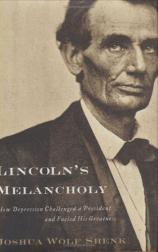Lincoln's Melancholy: How Depression Challenged a President And Fueled His Greatness
Review
Lincoln's Melancholy: How Depression Challenged a President And Fueled His Greatness
If we are to believe Joshua Wolf Shenk, it's amazing that Abraham
Lincoln was able to force himself out of bed each morning, let
alone attain the highest office in the land. But the "essayist and
independent scholar" takes great pains to educate the reader
regarding LINCOLN'S MELANCHOLY: How Depression Challenged a
President and Fueled His Greatness.
Relying on first-hand accounts from Lincoln's friends, family and
acquaintances, Shenk reports on the debilitating sadness that
governed Lincoln's life. How accurate are the observers who
proclaim Lincoln the saddest man they ever encountered? Yes, he had
difficulty in handling particularly upsetting news, such as the
deaths of his two sons and others close to him. Who among us would
not have felt down at that point? Or uttered a suicidal sentiment
in the face of extreme duress? The opposite seems to be true:
sanguine behavior in the face of tragedy would indicate
problems.
According to the author's criteria, anyone who has ever been sad
would seem to qualify as "mentally disturbed." In Lincoln's era,
one would be hard-pressed to find someone whom tragedy did
not touch: Sickness, early death, and a hard physical were
the norm in frontier living. Lincoln lost his mother at an early
age, he didn't get along well with his father, and his first true
love died before he had a chance to propose.
As the distance of time becomes greater, authors need to find new
issues about which to write. Perhaps this one was abused as a
child, or that one overcame learning disabilities. No one,
especially a celebrity, can accomplish anything without a
tremendous handicap to overcome.
Other than having received fellowships from the Carter Center's
mental health program, Shenk would seem to have little in the way
to recommend him as a "specialist" in the area of mental health.
While several chapters concentrate on "proof" of Lincoln's
situation, Shenk also writes of the political climate of the day
--- Lincoln's stance against slavery, his loss to Stephen Douglas
for the Senate, and the Civil War.
Shenk offers a chapter in this relatively slim book (350-plus
pages, of which more than 100 are notes and an index) on "A
Historiography of Lincoln's Melancholy." He has gone a long way to
prove his point.
Members of older generations can recall a time when each president
was a hero and no one had any skeletons in his closet. It has only
been the advance of time that has opened our eyes to the humanity
of these men. Indeed, it would be difficult to find a public figure
who has not exhibited feet of clay at some point.
Perhaps Lincolnologists will be particular fans of LINCOLN'S
MELANCHOLY, but average readers might be disappointed with this
portrayal of the 16th President.
Reviewed by Ron Kaplan (RonK23@aol.com) on December 30, 2010
Lincoln's Melancholy: How Depression Challenged a President And Fueled His Greatness
- Publication Date: September 27, 2005
- Genres: History, Nonfiction
- Hardcover: 368 pages
- Publisher: Houghton Mifflin Harcourt
- ISBN-10: 0618551166
- ISBN-13: 9780618551163



